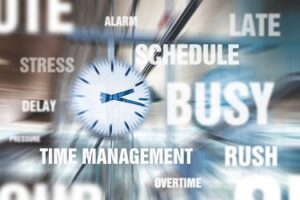 You don’t have to use any kind of digital tool to keep track of to-do lists and your time. If you have a system that works for you, then more power to you! I remember reading some time ago about a consultant who met with a very busy executive (I think she was a realtor) who used paper to-do lists and calendars to keep track of her tasks and schedule. She had Post-It notes stuck on her computer, pads of paper on her desk, and a duplicate set of lists for her assistant. It all looked very cluttered and low-tech, and she wanted to change to a computer-driven system.
You don’t have to use any kind of digital tool to keep track of to-do lists and your time. If you have a system that works for you, then more power to you! I remember reading some time ago about a consultant who met with a very busy executive (I think she was a realtor) who used paper to-do lists and calendars to keep track of her tasks and schedule. She had Post-It notes stuck on her computer, pads of paper on her desk, and a duplicate set of lists for her assistant. It all looked very cluttered and low-tech, and she wanted to change to a computer-driven system.
Could the organizer help her? Of course. So they set up everything digitally. Now she had a calendar on her computer which her assistant could access. Now the pads of paper were replaced by digital documents. You know where this is going, right? Within a few weeks she called the organizer back. Although she was happy with the look of her less-cluttered desk, she was starting to miss obligations. She failed to turn up for meetings. She didn’t keep appointments with clients. Her business was going into a tailspin. So the organizer asked what he should have asked originally: “How well did your old system work?” To which she replied, “It worked very well. I never missed a meeting. I always kept track of my clients. Now I feel lost.” Oh. The organizer did what he should have done to begin with, which was to suggest that she simply keep doing what she was doing and not worry about how her office looked. She got back into her paper-driven system and never looked back. My mother-in-law has a similar system in place for her and my father-in-law’s many activities and appointments. On the bulletin board in the kitchen are two calendars, one showing the current month and one the next. (I think that’s how it works, anyway.) If you ask her whether or not she’s free on a certain date she goes to the calendar(s). It works well for her. We had a paper calendar in our kitchen in the old house, but I wasn’t always careful to record items and so it wasn’t quite as dependable. Now I try to record items on my Google calendar and it’s shared with Jim. So far, so good.
I’ve wanted for some time to record tasks, goals and events on some sort of centralized app. Back awhile ago I wrote about “toggl,” a time-tracking app that I like quite a bit. Its one drawback is that it can’t function as a to-do list or a calendar. I wanted to have everything in one place in the fond hope that a centralized system would help me be more organized and productive. There was a brief foray into an app called “Wunderlist,” but it didn’t have a setting for recurring tasks. You couldn’t say that you wanted to do something Monday-Friday, or every other day, or Monday, Wednesday, Friday, or whatever. So I dropped it. Now I’ve discovered, after a ridiculous amount of web surfing, an app called “Todoist.” Its time settings are completely customizable and it can be integrated with toggl, although I have to go to the toggl page to see my time tracking. Right now toggl is running a timer for “blog post.” Nice. Todoist integrates with Google calendar, too. They have premium and business options which are paid, but for the life of me I can’t see that I need them, so I’m planning to stick with the freebie version, at least for now.
I’m finding that Todoist works well with the idea of “capture” that I wrote about yesterday with the David Allen book. The app has an “inbox” feature where you can just dump items with or without a due date. I’ve been finding this to be very useful, as I can write things down there and then later organize it into projects. So for instance last night we watched a fascinating documentary on PBS’s “Frontline” about the dangers of supplements—vitamins, herbs, etc. One danger stems from the lack of quality control about what’s in the supplements themselves (most of the time they don’t contain what they say they do) and one stems from the effectiveness (or non-effectiveness) of the supposed ingredient. Even if those capsules do contain saw palmetto, or black cohosh, or whatever, do those ingredients really do anything? Often the answer is no. Two authors who have written books on this subject were interviewed, so I grabbed my phone and entered the names of the books. I can look them up at the library later, but for now I at least have the titles. I can perhaps start a project labeled “books to read.” And as I’m writing this post I’m reminded that the teacher in last week’s Bible study mentioned a couple of books that I want to read. I scribbled down the titles in my workbook, but unless I remember to go back in the book and look them up I might as well not have bothered.
So take a look if this sounds interesting. Capture those thoughts!